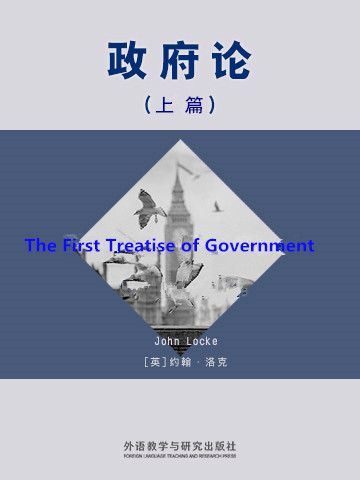近代资产阶级革命的《圣经》,媲美亚里士多德的《政治学》。
The First Treatise is an extended attack on Sir Robert Filmer's Patriarcha. Locke's argument proceeds along two lines: first, he undercuts the Scriptural support that Filmer had offered for his thesis, and second he argues that the acceptance of Filmer's thesis can lead only to slavery (and absurdity). Locke chose Filmer as his target, he says, because of his reputation and because he "carried this Argument farthest, and is supposed to have brought it to perfection".
《政府论》是英国约翰·洛克于1690年出版的政治著作,汇集了洛克的主要政治哲学思想,不仅使洛克成为古典自由主义思想的集大成者,而且对于后世的现实政治产生了深远的影响。该书分为上下两篇,上篇集中驳斥了当时占统治地位的君权神授说和王位世袭论,下篇系统地阐述了公民政府的真正起源、范围、目的。全书出色地完成了为英国资产阶级革命辩护的任务,对英国政治、经济的发展起到了巨大的推动作用。
Two Treatises of Government, a work of political philosophy by John Locke, attacks patriarchalism in the form of sentence-by-sentence refutation of Robert Filmer's Patriarcha, and outlines Locke's ideas for a more civilized society based on natural rights and contract theory. From this, he goes on to explain the hypothetical rise of property and civilization, in the process explaining that the only legitimate governments are those that have the consent of the people. Therefore, any government that rules without the consent of the people can, in theory, be overthrown.
- Chapter I The Introduction
- Chapter II Of Paternal and Regal Power
- Chapter III Of Adam's Title to Sovereignty by Creation
- Chapter IV Of Adam's Title to Sovereignty, by Donation
- Chapter V Of Adam's Title to Sovereignty, by the Subjection of Eve.
- Chapter VI Of Adam's Title to Sovereignty by Fatherhood
- Chapter VII Of Fatherhood and Property considered together as Fountains of Sovereignty
- Chapter VIII Of the Conveyance of Adam's sovereigns monarchical Power
- Chapter IX Of Monarchy by Inheritance from Adam
- Chapter X Of the Heir to Adam's Monarchical Power
- Chapter XI Who Heir?





















 京公网安备 11010802032529号
京公网安备 11010802032529号
笔记加载中...